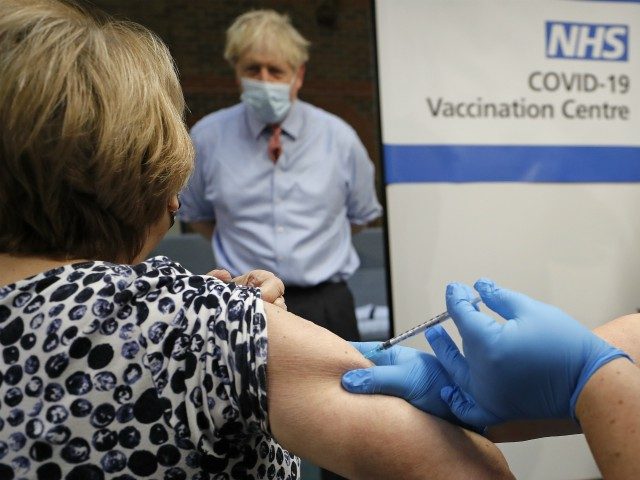A member of the British government’s Scientific Advisory Group for Emergencies (Sage) has said that it could take a whole year to vaccinate the entire United Kingdom, adding that it is not known if the new vaccines will actually stop people from passing on Chinese coronavirus.
While Britons might have hoped that the recent approval and rollout of the Pfizer/BioNTech vaccine would have afforded them a return to normal by Spring, SAGE’s Sir Jeremy Farrar and Professor Tim Cook, an intensive care medical consult from the University of Bristol, penned a warning to the contrary in an article for the journal, Anaesthesia.
“The scale of the vaccination programme should not be underestimated: 1,000 vaccination centres each vaccinating 500 people a day for five days a week, without interruptions of supply or delivery, would take almost a year to provide two doses to the UK population,” Sir Jeremy and Professor Cook wrote, according to The Mirror.
Not only could it take a year to vaccinate the country, but the injections may only be good enough at stopping people becoming very ill, not stopping them from being contagious, which could lead to the UK suffering under continued social distancing and periodic lockdowns for the foreseeable future.
The authors said the first vaccines produced “may be more effective in preventing disease progression and hospitalisation and less effective in preventing transmission”, adding that further “nasally administered vaccines or adjuncts” might be needed to achieve a “sterilising immunity” state.
Vaccines will not be “a final solution to Covid-19”, the scientists said, adding: “This is now a human endemic infection, which will not disappear, and like all infectious diseases, we will need to learn to mitigate its impact through adapting our behaviour and access to diagnostics, treatments and vaccines.”
London’s Khan: Make Public Wear Masks Outside, Don’t Relax Corona Rules For Christmas https://t.co/foX3cfIXJG
— Breitbart London (@BreitbartLondon) December 15, 2020
Just last week, the country’s chief scientific advisor Sir Patrick Vallance said that Britons, post-vaccine rollout, would still have to wear masks and socially distance long into 2021.
“It may be that next winter, even with vaccination, we need measures like masks in place — we don’t know yet how good all the vaccines are going to be at preventing the transmission of the virus,” Sir Patrick told Sky News.
Last month, Vallance said that even with the development of successful vaccines, viruses mutate “and other forms arise that would require new vaccines in due course. So I don’t think it is the case that the vaccines we have now will be the ones we have forever, we may have to get new ones.”
Health Secretary Matt Hancock told the House of Commons on Monday that a “new variant” of the Chinese coronavirus had been found in the UK, which may have contributed to a rise in cases in the south-east of England, but said “there is currently nothing to suggest that this variant is more likely to cause serious disease”.
The minister also added that “it’s highly unlikely this mutation would fail to respond to a vaccine”.
Farage Brands Welsh Leader a ‘Maniac’ for Blaming Public for Coronavirus https://t.co/l7UGcMGvaX
— Breitbart London (@BreitbartLondon) December 12, 2020

COMMENTS
Please let us know if you're having issues with commenting.